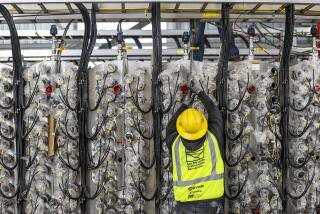Bill Has $40 Million for S.D. Sewage Plant : Environment: House-Senate committee also approves $5.5 million to reimburse city for repairing pipe rupture.
WASHINGTON — A House-Senate conference committee agreed Tuesday to spend $40 million to upgrade the San Diego sewage treatment plant and reimburse the city $5.5 million for repairing an outflow pipe rupture that fouled water and closed beaches early this year.
The committee also approved $32.5 million for continued construction of the international water treatment plant on the Mexican border to combat waste flows from Tijuana’s overburdened treatment facilities.
In line with the city’s plans, the money earmarked for the municipal treatment plant can be used for extending the existing outflow pipe farther into the ocean.
San Diego and the U.S. Environmental Protection Agency have joined in a consent decree that obligates the city to upgrade the plant to secondary treatment, but the city feels the existing advanced primary treatment is adequate and fears the improvements will double sewage rates.
According to aides for Rep. Bill Lowery (R-San Diego), who sits on the V.A./HUD subcommittee, the city reached a tacit agreement that the EPA would not oppose the funds being used for the outfall extension, even though it does not specifically address EPA’s goal of more thorough treatment.
When the outflow pipe burst in early February, the city used $5.5 million in upgrading funds for repair work. The conference appropriation Tuesday restores that money to the city.
The international treatment plant is about half-completed, with a scheduled operational date in 1996.
The Senate wanted to eliminate the funds altogether but later agreed to place the project into a revolving state fund, where it would face stiff competition from other projects across the country. In conference negotiations, the $32.5 million for San Diego was restored as a direct grant.
Similar border treatment projects at Mexicali and Nogales, Ariz., remained in the less-certain revolving fund.
Conferees were particularly sensitive to cutting funds for border environmental projects, said Lowery aides, when much attention has been placed on the North American Free Trade Agreement, which would stimulate more polluting industry along the U.S.-Mexico border.
Lowery, who is retiring from the House this year, has sat on the V.A./HUD subcommittee for two years.
Also approved by the conference committee was a $2-million grant to a consortium of universities in the Southwest to study air and water pollution on the Mexican border.
San Diego State University joins the University of Texas-El Paso, the University of Utah, the University of Arizona and New Mexico State University in the study group.
Lowery aides said passage of the conference bill was expected, although a proposed change in the V.A. home loan program could hang it up when it comes up for a vote on the House floor.
In a separate conference committee action, funds were approved to build 300 units of family housing for Marines at Camp Pendleton, and an additional 300 units were approved for Navy housing throughout the area.
About 13,000 units of military family housing are still needed to meet demand in the San Diego region, according to aides for Lowery, who is the ranking member on the military construction subcommittee.
More to Read
Sign up for Essential California
The most important California stories and recommendations in your inbox every morning.
You may occasionally receive promotional content from the Los Angeles Times.










